Boothbay region gathers in solidarity to mourn George Floyd
 Some of the attendees at Sunday’s gathering on the Boothbay Common. JOSEPH CHARPENTIER/Boothbay Register
Some of the attendees at Sunday’s gathering on the Boothbay Common. JOSEPH CHARPENTIER/Boothbay Register
 Event organizer Barbara Burgess welcomes the crowd. JOSEPH CHARPENTIER/Boothbay Register
Event organizer Barbara Burgess welcomes the crowd. JOSEPH CHARPENTIER/Boothbay Register
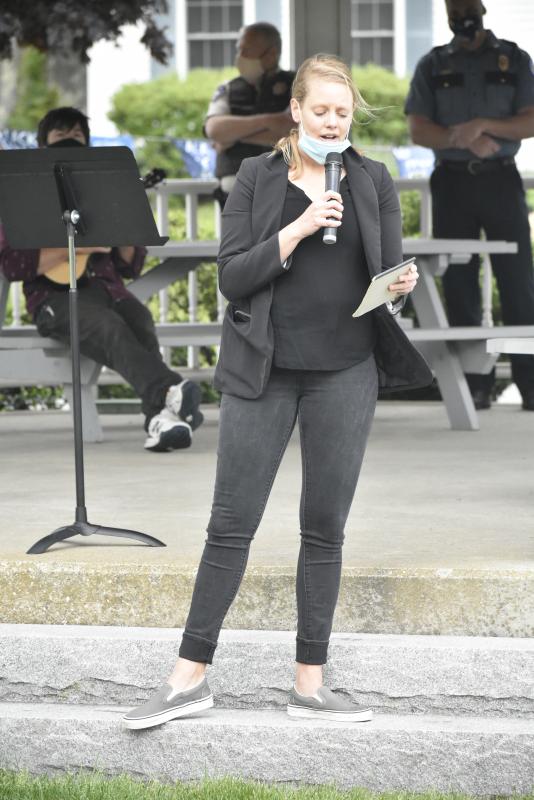 Event organizer Catherine Tracy extends the welcome. JOSEPH CHARPENTIER/Boothbay Register
Event organizer Catherine Tracy extends the welcome. JOSEPH CHARPENTIER/Boothbay Register
 Boothbay Harbor Congregational Church Pastor Peter Ilgenfritz. JOSEPH CHARPENTIER/Boothbay Register
Boothbay Harbor Congregational Church Pastor Peter Ilgenfritz. JOSEPH CHARPENTIER/Boothbay Register
 JOSEPH CHARPENTIER/Boothbay Register
JOSEPH CHARPENTIER/Boothbay Register
 JOSEPH CHARPENTIER/Boothbay Register
JOSEPH CHARPENTIER/Boothbay Register
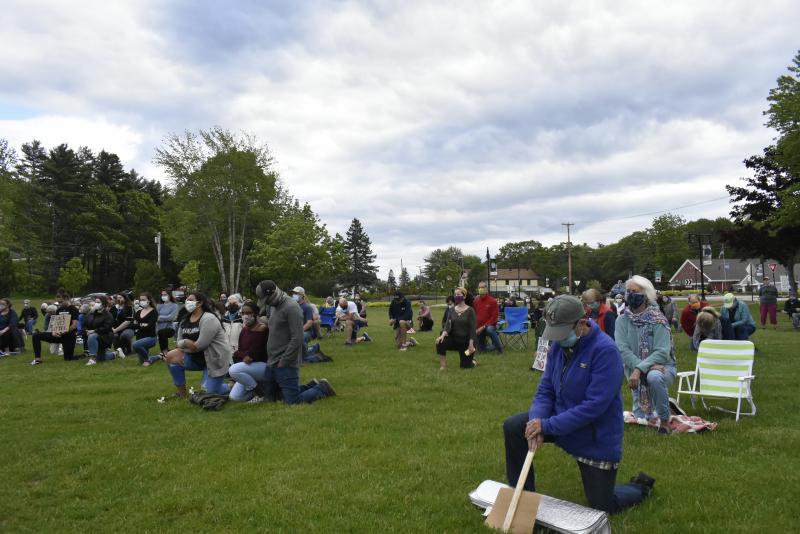 JOSEPH CHARPENTIER/Boothbay Register
JOSEPH CHARPENTIER/Boothbay Register
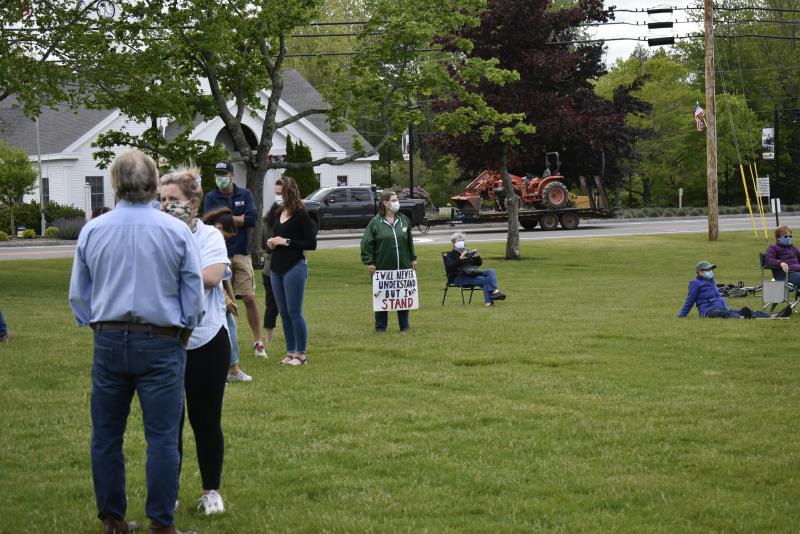 JOSEPH CHARPENTIER/Boothbay Register
JOSEPH CHARPENTIER/Boothbay Register
 JOSEPH CHARPENTIER/Boothbay Register
JOSEPH CHARPENTIER/Boothbay Register
 JOSEPH CHARPENTIER/Boothbay Register
JOSEPH CHARPENTIER/Boothbay Register
 JOSEPH CHARPENTIER/Boothbay Register
JOSEPH CHARPENTIER/Boothbay Register
 Andreas Panagore provides the music. JOSEPH CHARPENTIER/Boothbay Register
Andreas Panagore provides the music. JOSEPH CHARPENTIER/Boothbay Register
 JOSEPH CHARPENTIER/Boothbay Register
JOSEPH CHARPENTIER/Boothbay Register
 JOSEPH CHARPENTIER/Boothbay Register
JOSEPH CHARPENTIER/Boothbay Register
 JOSEPH CHARPENTIER/Boothbay Register
JOSEPH CHARPENTIER/Boothbay Register
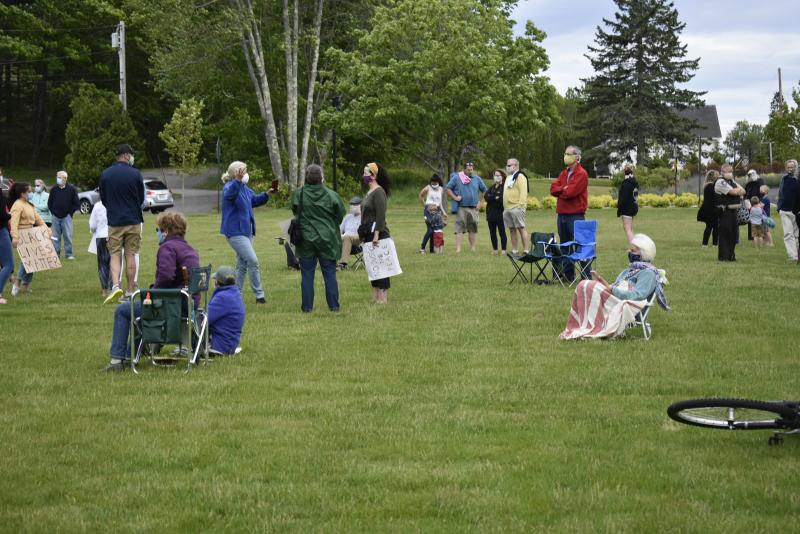 JOSEPH CHARPENTIER/Boothbay Register
JOSEPH CHARPENTIER/Boothbay Register
 JOSEPH CHARPENTIER/Boothbay Register
JOSEPH CHARPENTIER/Boothbay Register
 JOSEPH CHARPENTIER/Boothbay Register
JOSEPH CHARPENTIER/Boothbay Register
 JOSEPH CHARPENTIER/Boothbay Register
JOSEPH CHARPENTIER/Boothbay Register
 JOSEPH CHARPENTIER/Boothbay Register
JOSEPH CHARPENTIER/Boothbay Register
 JOSEPH CHARPENTIER/Boothbay Register
JOSEPH CHARPENTIER/Boothbay Register
 JOSEPH CHARPENTIER/Boothbay Register
JOSEPH CHARPENTIER/Boothbay Register
 JOSEPH CHARPENTIER/Boothbay Register
JOSEPH CHARPENTIER/Boothbay Register
 Boothbay Harbor United Methodist Church Reverend Richard Rego. JOSEPH CHARPENTIER/Boothbay Register
Boothbay Harbor United Methodist Church Reverend Richard Rego. JOSEPH CHARPENTIER/Boothbay Register
 Maine House District 89’s Holly Stover introduces local law enforcement. JOSEPH CHARPENTIER/Boothbay Register
Maine House District 89’s Holly Stover introduces local law enforcement. JOSEPH CHARPENTIER/Boothbay Register
 Boothbay Harbor Police Chief Bob Hasch. JOSEPH CHARPENTIER/Boothbay Register
Boothbay Harbor Police Chief Bob Hasch. JOSEPH CHARPENTIER/Boothbay Register
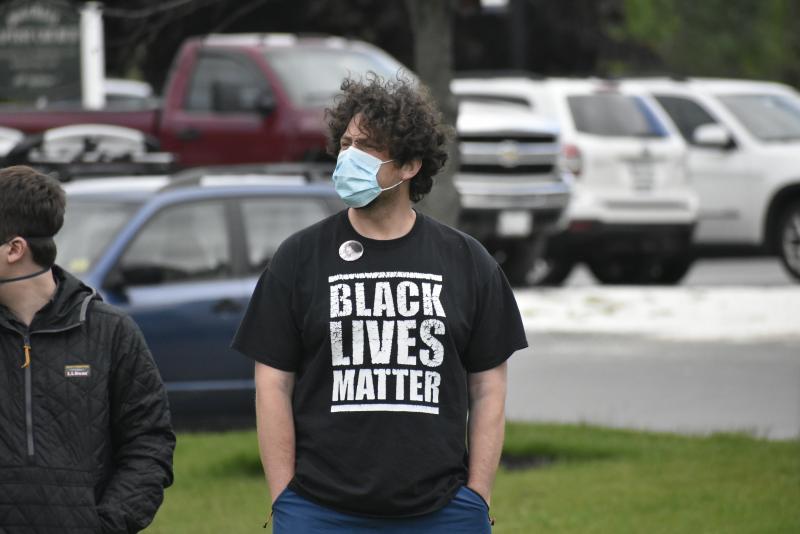 JOSEPH CHARPENTIER/Boothbay Register
JOSEPH CHARPENTIER/Boothbay Register
 JOSEPH CHARPENTIER/Boothbay Register
JOSEPH CHARPENTIER/Boothbay Register
 Lincoln County Sheriff Todd Brackett. JOSEPH CHARPENTIER/Boothbay Register
Lincoln County Sheriff Todd Brackett. JOSEPH CHARPENTIER/Boothbay Register
 JOSEPH CHARPENTIER/Boothbay Register
JOSEPH CHARPENTIER/Boothbay Register
 JOSEPH CHARPENTIER/Boothbay Register
JOSEPH CHARPENTIER/Boothbay Register
 Chief Hasch and Sheriff Brackett kneel leading nearly nine minutes of silence JOSEPH CHARPENTIER/Boothbay Register
Chief Hasch and Sheriff Brackett kneel leading nearly nine minutes of silence JOSEPH CHARPENTIER/Boothbay Register
 Andreas Panagore provides music. JOSEPH CHARPENTIER/Boothbay Register
Andreas Panagore provides music. JOSEPH CHARPENTIER/Boothbay Register
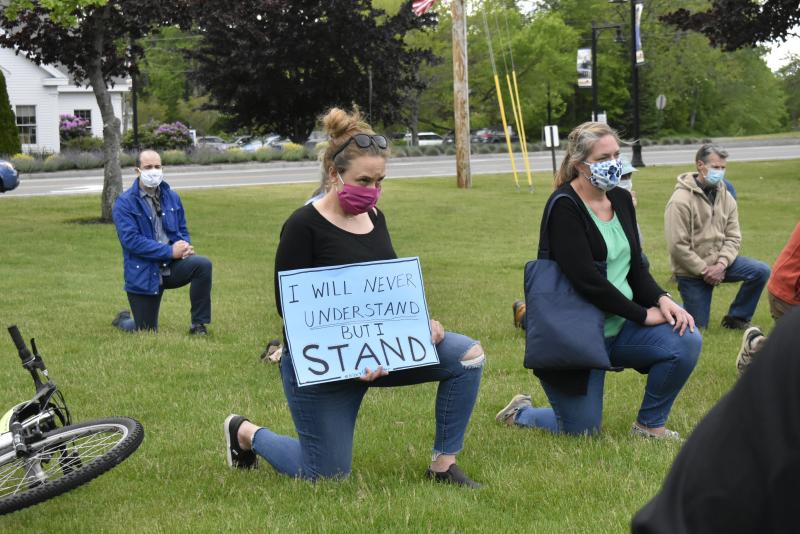 JOSEPH CHARPENTIER/Boothbay Register
JOSEPH CHARPENTIER/Boothbay Register
 JOSEPH CHARPENTIER/Boothbay Register
JOSEPH CHARPENTIER/Boothbay Register
 JOSEPH CHARPENTIER/Boothbay Register
JOSEPH CHARPENTIER/Boothbay Register
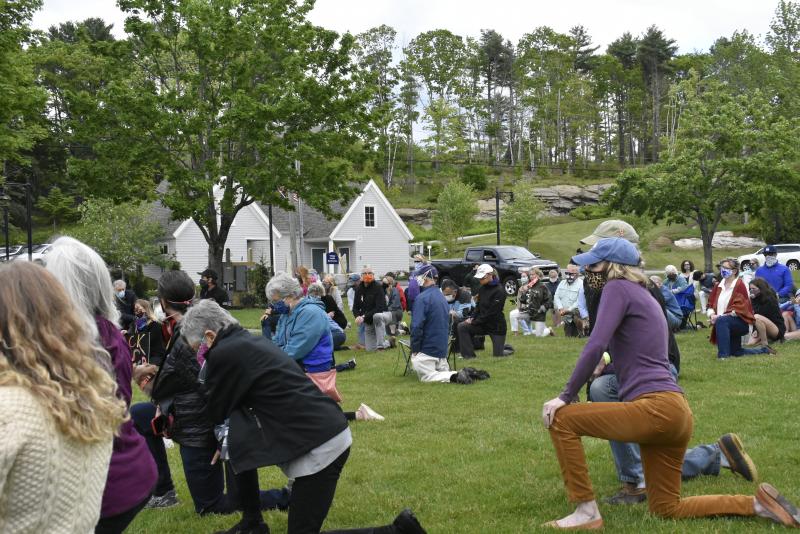 JOSEPH CHARPENTIER/Boothbay Register
JOSEPH CHARPENTIER/Boothbay Register
 JOSEPH CHARPENTIER/Boothbay Register
JOSEPH CHARPENTIER/Boothbay Register
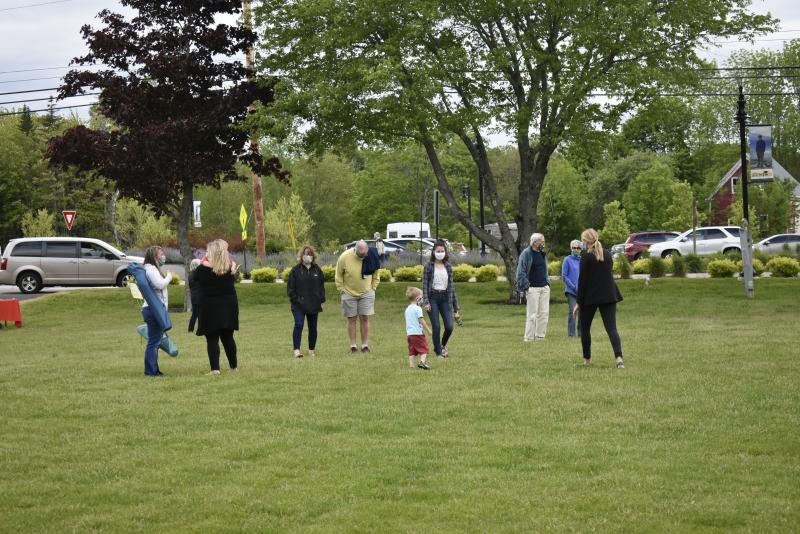 JOSEPH CHARPENTIER/Boothbay Register
JOSEPH CHARPENTIER/Boothbay Register
 JOSEPH CHARPENTIER/Boothbay Register
JOSEPH CHARPENTIER/Boothbay Register
 JOSEPH CHARPENTIER/Boothbay Register
JOSEPH CHARPENTIER/Boothbay Register
 JOSEPH CHARPENTIER/Boothbay Register
JOSEPH CHARPENTIER/Boothbay Register
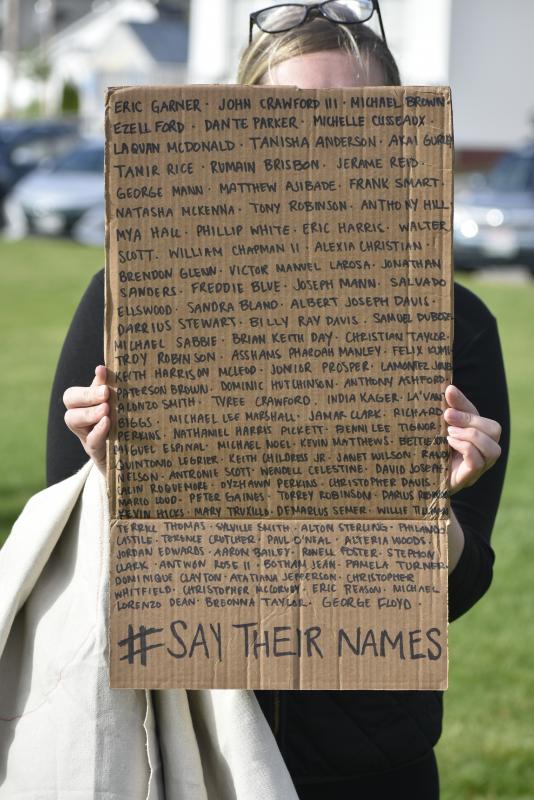 JOSEPH CHARPENTIER/Boothbay Register
JOSEPH CHARPENTIER/Boothbay Register
 JOSEPH CHARPENTIER/Boothbay Register
JOSEPH CHARPENTIER/Boothbay Register
 Some of the attendees at Sunday’s gathering on the Boothbay Common. JOSEPH CHARPENTIER/Boothbay Register
Some of the attendees at Sunday’s gathering on the Boothbay Common. JOSEPH CHARPENTIER/Boothbay Register
 Event organizer Barbara Burgess welcomes the crowd. JOSEPH CHARPENTIER/Boothbay Register
Event organizer Barbara Burgess welcomes the crowd. JOSEPH CHARPENTIER/Boothbay Register
 Event organizer Catherine Tracy extends the welcome. JOSEPH CHARPENTIER/Boothbay Register
Event organizer Catherine Tracy extends the welcome. JOSEPH CHARPENTIER/Boothbay Register
 Boothbay Harbor Congregational Church Pastor Peter Ilgenfritz. JOSEPH CHARPENTIER/Boothbay Register
Boothbay Harbor Congregational Church Pastor Peter Ilgenfritz. JOSEPH CHARPENTIER/Boothbay Register
 JOSEPH CHARPENTIER/Boothbay Register
JOSEPH CHARPENTIER/Boothbay Register
 JOSEPH CHARPENTIER/Boothbay Register
JOSEPH CHARPENTIER/Boothbay Register
 JOSEPH CHARPENTIER/Boothbay Register
JOSEPH CHARPENTIER/Boothbay Register
 JOSEPH CHARPENTIER/Boothbay Register
JOSEPH CHARPENTIER/Boothbay Register
 JOSEPH CHARPENTIER/Boothbay Register
JOSEPH CHARPENTIER/Boothbay Register
 JOSEPH CHARPENTIER/Boothbay Register
JOSEPH CHARPENTIER/Boothbay Register
 JOSEPH CHARPENTIER/Boothbay Register
JOSEPH CHARPENTIER/Boothbay Register
 Andreas Panagore provides the music. JOSEPH CHARPENTIER/Boothbay Register
Andreas Panagore provides the music. JOSEPH CHARPENTIER/Boothbay Register
 JOSEPH CHARPENTIER/Boothbay Register
JOSEPH CHARPENTIER/Boothbay Register
 JOSEPH CHARPENTIER/Boothbay Register
JOSEPH CHARPENTIER/Boothbay Register
 JOSEPH CHARPENTIER/Boothbay Register
JOSEPH CHARPENTIER/Boothbay Register
 JOSEPH CHARPENTIER/Boothbay Register
JOSEPH CHARPENTIER/Boothbay Register
 JOSEPH CHARPENTIER/Boothbay Register
JOSEPH CHARPENTIER/Boothbay Register
 JOSEPH CHARPENTIER/Boothbay Register
JOSEPH CHARPENTIER/Boothbay Register
 JOSEPH CHARPENTIER/Boothbay Register
JOSEPH CHARPENTIER/Boothbay Register
 JOSEPH CHARPENTIER/Boothbay Register
JOSEPH CHARPENTIER/Boothbay Register
 JOSEPH CHARPENTIER/Boothbay Register
JOSEPH CHARPENTIER/Boothbay Register
 JOSEPH CHARPENTIER/Boothbay Register
JOSEPH CHARPENTIER/Boothbay Register
 JOSEPH CHARPENTIER/Boothbay Register
JOSEPH CHARPENTIER/Boothbay Register
 Boothbay Harbor United Methodist Church Reverend Richard Rego. JOSEPH CHARPENTIER/Boothbay Register
Boothbay Harbor United Methodist Church Reverend Richard Rego. JOSEPH CHARPENTIER/Boothbay Register
 Maine House District 89’s Holly Stover introduces local law enforcement. JOSEPH CHARPENTIER/Boothbay Register
Maine House District 89’s Holly Stover introduces local law enforcement. JOSEPH CHARPENTIER/Boothbay Register
 Boothbay Harbor Police Chief Bob Hasch. JOSEPH CHARPENTIER/Boothbay Register
Boothbay Harbor Police Chief Bob Hasch. JOSEPH CHARPENTIER/Boothbay Register
 JOSEPH CHARPENTIER/Boothbay Register
JOSEPH CHARPENTIER/Boothbay Register
 JOSEPH CHARPENTIER/Boothbay Register
JOSEPH CHARPENTIER/Boothbay Register
 Lincoln County Sheriff Todd Brackett. JOSEPH CHARPENTIER/Boothbay Register
Lincoln County Sheriff Todd Brackett. JOSEPH CHARPENTIER/Boothbay Register
 JOSEPH CHARPENTIER/Boothbay Register
JOSEPH CHARPENTIER/Boothbay Register
 JOSEPH CHARPENTIER/Boothbay Register
JOSEPH CHARPENTIER/Boothbay Register
 Chief Hasch and Sheriff Brackett kneel leading nearly nine minutes of silence JOSEPH CHARPENTIER/Boothbay Register
Chief Hasch and Sheriff Brackett kneel leading nearly nine minutes of silence JOSEPH CHARPENTIER/Boothbay Register
 Andreas Panagore provides music. JOSEPH CHARPENTIER/Boothbay Register
Andreas Panagore provides music. JOSEPH CHARPENTIER/Boothbay Register
 JOSEPH CHARPENTIER/Boothbay Register
JOSEPH CHARPENTIER/Boothbay Register
 JOSEPH CHARPENTIER/Boothbay Register
JOSEPH CHARPENTIER/Boothbay Register
 JOSEPH CHARPENTIER/Boothbay Register
JOSEPH CHARPENTIER/Boothbay Register
 JOSEPH CHARPENTIER/Boothbay Register
JOSEPH CHARPENTIER/Boothbay Register
 JOSEPH CHARPENTIER/Boothbay Register
JOSEPH CHARPENTIER/Boothbay Register
 JOSEPH CHARPENTIER/Boothbay Register
JOSEPH CHARPENTIER/Boothbay Register
 JOSEPH CHARPENTIER/Boothbay Register
JOSEPH CHARPENTIER/Boothbay Register
 JOSEPH CHARPENTIER/Boothbay Register
JOSEPH CHARPENTIER/Boothbay Register
 JOSEPH CHARPENTIER/Boothbay Register
JOSEPH CHARPENTIER/Boothbay Register
 JOSEPH CHARPENTIER/Boothbay Register
JOSEPH CHARPENTIER/Boothbay Register
 JOSEPH CHARPENTIER/Boothbay Register
JOSEPH CHARPENTIER/Boothbay Register
Around 300 Boothbay region community members gathered June 7 to mourn the loss of George Floyd with flags and signs bearing expressions of the Black Lives Matter movement. The demonstration at the Boothbay common was organized by Barbara Burgess and Catherine Tracy and included guest speakers from the region’s faith and law enforcement communities: Boothbay Harbor Congregational Church Pastor Peter Ilgenfritz, Boothbay Harbor United Methodist Church Reverend Richard Rego, Boothbay Harbor Police Chief Bob Hasch and Lincoln County Sheriff Todd Brackett.
Demonstrators were greeted on the common with stones with hearts painted on them. Burgess welcomed the crowd and explained why the metaphor of a stone is so important. “When you toss a stone into the water, it creates ripples that go far beyond the stone itself and we're hoping today that we will inspire all of you to take an action, big or small, and make ripples that will create a more fair, more just, more equitable and more empathetic country for all black lives.”
Said Tracy, “This fight against racism is far from over and it's our job to continue this conversation in our community and to keep each other accountable. We need to stand up to the injustices and take that call of action by voting, by donating, by marching or rallying and continuing to educate yourself.”
Ilgenfritz, now in his fifth month as pastor of Congo Church, spoke about how grateful he is to have been embraced by his congregation. He said he has only just begun finding his place in the community. “But one thing and one place where I know my place – is my place and my role in systemic racism. This crisis has revealed the way African-Americans have been disproportionately affected by this virus, by police brutality and by systemic racism … I know the ways systemic racism has supported me and I know the ways that I benefit from it.”
Reverend Rego expanded on Ilgenfritz’s sentiments stating that the Sunday demonstration is only the start of a work in progress toward ending racism and confronting it in our families and communities. Rego preached empathy toward others and checking the white privilege within ourselves to move forward to a better world.
“In the wake left by the death of George Floyd, we each need to do our own work to break apart the racist structures, unjust policies, offensive and bigoted attitudes and behaviors that every community encounters within and around us … As children of God, we are all called to be sensitive to the pain of the disenfranchised within the mandate to love our neighbor. In that spirit of change, we must actively listen and learn to make positive changes not just to feel good about ourselves and go home, but to be willing to be where the rubber hits the road, an active catalyst for change for loving our neighbor. We still have much work to do, and it's going to have to start with you.”
Chief Hasch spoke about his apprehension joining the demonstration in uniform. “When I started police work, I went for a few years and … as I got into more complex issues, I had a little bit of a harder time because I felt empathy for people. I would listen to people and I felt their pain. I've had a lot of discussion with my family about that and I thought maybe this isn't the business for me … We have empathy and that's why we were going to come out of uniform because I feel the same way you all feel about this. It's horrific. It's – horrific.”
Hasch said everyone needs to have more empathy, not just law enforcement. Because racism is an “everywhere issue,” Hasch said, there is much work to be done in our own communities to ensure everyone is treated equally. While Hasch and his officers continue to train, there is more to embracing a greater compassion in law enforcement, he said.
“I don't know that I can tell the whole world how to do police work because I can't. I'm just a small town police chief. But I can tell you that we've done some incredible things with people by reaching out, not just by sitting and waiting in our police department for things to go wrong… People will come to us now … and tell us when they have problems. Don't we need more of that?”
Sheriff Brackett became frank with his sadness and anger with the murder of Floyd, the responsible officers and the opportunistic looters bringing a bad name to the hundreds of thousands of peaceful protesters across the nation and the world.
“… I'm saddened first and foremost for the loss to the Floyd family which is why we're here today … I'm angered by the fact that it's taken another tragedy like this one to raise the level of debate in our country over racism and biased policing … I'm saddened by the faces and voices of adults and their children who have appropriately expressed fear and distrust toward my profession …”
Brackett said there is no room for biased racial policing in law enforcement, only valued morals and empathy toward others. Pledging to do everything in his power to continue to build trust with local law enforcement and to keep empathy and other high-held values on the force, Brackett knelt leading an eight minutes and 47 seconds moment of silence – the same amount of time Minneapolis Police Officer Derek Chauvin knelt on the neck of citizen George Floyd, noted Brackett.
Event Date
Address
United States












































































































